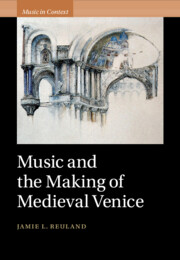Book contents
- Music and the Making of Medieval Venice
- Music in Context
- Music and the Making of Medieval Venice
- Copyright page
- Dedication
- Contents
- Figures
- Maps
- Tables
- Music Examples
- Acknowledgments
- Manuscript Sigla
- A Note on Dating
- Abbreviations
- Introduction
- Part I An Audible Empire
- 1 Echoes of Empire
- 2 Unsilenced Archives
- Part II The Fictive City
- Part III Relics and the Horizons of Musical Representation
- Book part
- Bibliography
- Index
2 - Unsilenced Archives
Icons, Advocates, and the Akathistos Hymn
from Part I - An Audible Empire
Published online by Cambridge University Press: 12 October 2023
- Music and the Making of Medieval Venice
- Music in Context
- Music and the Making of Medieval Venice
- Copyright page
- Dedication
- Contents
- Figures
- Maps
- Tables
- Music Examples
- Acknowledgments
- Manuscript Sigla
- A Note on Dating
- Abbreviations
- Introduction
- Part I An Audible Empire
- 1 Echoes of Empire
- 2 Unsilenced Archives
- Part II The Fictive City
- Part III Relics and the Horizons of Musical Representation
- Book part
- Bibliography
- Index
Summary
Already by the late thirteenth century, the laudes ceremony had become a weekly feature of civic life on the island, performed each Tuesday in the capital city of Candia in a ritual that symbolized interfaith relations on the island. It was folded into the veneration of icons and encounters with the miraculous, became a site for resolving personal disputes, and was referenced and represented deep within the rugged interior of the island in the decorative programs of rural chapels. Each of these configurations, explored in Chapter 2, reveals a different facet of a political imagination that gave music the power to represent the state in all its members, local and far-flung, visible and invisible, human and divine. Studying the performance of laudes in all its variety gives us glimpses into the chaotic reality out of which Venice’s project of empire was forged in the early years. Both Latin and Greek populations on the island adopted the laudes as a space to negotiate and contest colonial identity. Far from expressing unanimous agreement, the laudes had, by the fourteenth century, become a spectacular arena of dispute on the island.
- Type
- Chapter
- Information
- Music and the Making of Medieval Venice , pp. 42 - 78Publisher: Cambridge University PressPrint publication year: 2023

